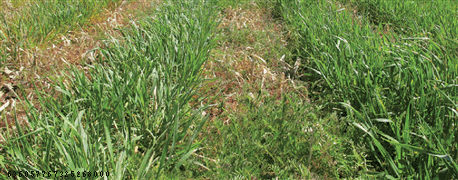
Each year, more and more farmers are planting cover crops. With the use of cover crops becoming more prominent, a group of Iowa State University researchers has created a publication to answer common producer questions about their use.
Former Iowa State graduate students Andrea Basche and Gabrielle Roesch-McNally and current undergraduate student Rebecca Clay, under the guidance of associate professor Fernando Miguez wrote the publication “Answering Common Producer Questions on Cover Crop Use in Iowa” (HORT 3053). The publication is available through the ISU Extension Store.

COVER CROP CHOICES: There are a number of cover crop options to choose from for planting in Iowa. This photo shows hairy vetch growing between strips of cereal rye.
The authors combined existing scientific research and information gathered during focus group discussions with Iowa farmers to complete the publication.
Answers to producer questions on cover crop management
“There is already a great deal of research that has been done on cover crops – from extensive on-farm trials to long-term government and university research – across Iowa and the Midwest,” says Basche. “We wanted to provide a short resource to aggregate this research in response to producer questions on cover crop management and costs, specifically those growing corn and soybeans.”
The publication asks a series of questions, using research and input from farmers who use cover crops to provide fact-based answers to those questions.
The questions answered in the publication are:
* How do cover crops impact corn yield?
* What are other cover crop plant species options for Iowa?
* How do cover crops influence nitrogen rate and timing for the following cash crop?
* How does a cover crop affect my bottom line?
“The topics addressed in this publication were questions that producers continually raised during our focus group discussions,” says Basche. “There is a desire to understand how cover crops impact corn yield, how to manage nitrogen following a cover crop, how species beyond cereal rye perform in Iowa as well as what information exists on the economic value of soil.”
Why do soils need amending?
Another new information source publication, this one online, is available. The soils in which we grow food needs to be fed—and fed the right nutrients. The Soil Science Society of America in its August 1 “Soils Matter” blog post explains how soils change over time and use, and how precise soil nutrition can make a difference.
“Plant life, whether trees, grass, flowers or field crops depends on soil to provide its nutrients,” says Dave Mengel, agronomist and certified crop adviser. ”But, along with weathering, plants use up nutrients, and don’t usually replace them. The more intensively crops are raised, and the greater portion of the plant removed, the faster soils become depleted of natural fertility.”
Young soil, old soil and replacing soil nutrients
Soil tests can help determine what your soil needs. Using this information, farmers and gardeners can choose products that provide just the right nutrients. This avoids wasteful application of unnecessary products and reduces pollution.
“Growers can determine the right mix of manures, compost or fertilizers to ensure the right amounts of nutrients are applied, and over application of others is avoided,” says Mengel. To read the entire blog post, visit soilsmatter.wordpress.com.
Follow SSSA on Facebook at facebook.com/SSSA.soils, Twitter at SSSA_Soils. SSSA has soils information on soils.org/discover-soils, for teachers at soils4teachers.org, and for students through 12th grade, soils4kids.org.
About the Author(s)
You May Also Like




